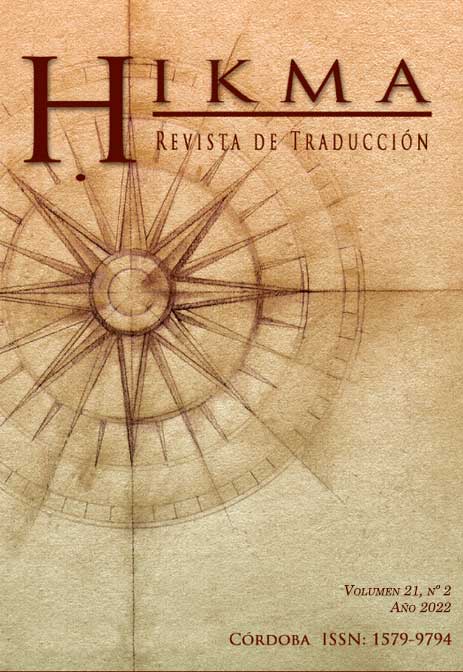Linguistic typology as a determining factor in poetic translation Linguistic and stylistic analysis of different translations of a Japanese haiku into languages of typologically different groups
Main Article Content
Abstract
This article focuses on demonstrating how poetic translation is closely dependent on linguistic typology. Poetic translation is characterized by its focus on the aesthetic function of language, which is the reason that the form is especially relevant. It is precisely for this reason that this article is about Japanese haiku, a poetic form characterized by its brevity and its conceptualism, so that the minimum expression must convey the maximum content.
Specifically, a famous haiku by Bashō is going to be analysed, considered the paradigm of the haikus of this author's school, to demonstrate how the linguistic typology of the Japanese language facilitates the expression of the aesthetic sense that the poem transmits. It is true that this famous haiku has been analyzed on countless occasions, but what is proposed in this work is an analysis from the linguistic typology, a demonstration of how the typological characteristics of Japanese are intimately related to the aesthetics of Bashō's haiku, and a demonstration also of how this adaptation between the source language and the meaning of the poem constitutes a real problem for the translation, the solutions of which will be evaluated in two typologically different languages, English and Spanish.
The work is divided into the following parts: First, the typological characteristics of Japanese are exposed compared to those of languages of other linguistic types. Next, the abstract meaning transmitted by the poems of the Bashō school is made explicit, which will allow us to establish the characteristics of their aesthetics. Next, the adequacy between the linguistic typology of Japanese and the essence of the content that the poem intends to convey will be shown. Finally, several translations of the poem into two languages of different typological groups, English and Spanish, will be analysed, and it will be judged to what extent it is possible to achieve the translation in each language.
Keywords: Translation, Linguistic typology, Haiku, Bashō
Downloads
Article Details

This work is licensed under a Creative Commons Attribution-NonCommercial-ShareAlike 4.0 International License.
Authors who publish with this journal agree to the following terms:
1. Authors retain copyright and grant the journal right of first publication with the work simultaneously licensed under a Creative Commons Attribution License that allows others to share the work with an acknowledgement of the work's authorship and initial publication in this journal.
2. Authors are able to enter into separate, additional contractual arrangements for the non-exclusive distribution of the journal's published version of the work (e.g., post it to an institutional repository or publish it in a book), with an acknowledgement of its initial publication in this journal.
3. Authors are permitted and encouraged to post their work online (e.g., in institutional repositories or on their website) prior to and during the submission process, as it can lead to productive exchanges, as well as earlier and greater citation of published work (See The Effect of Open Access).

